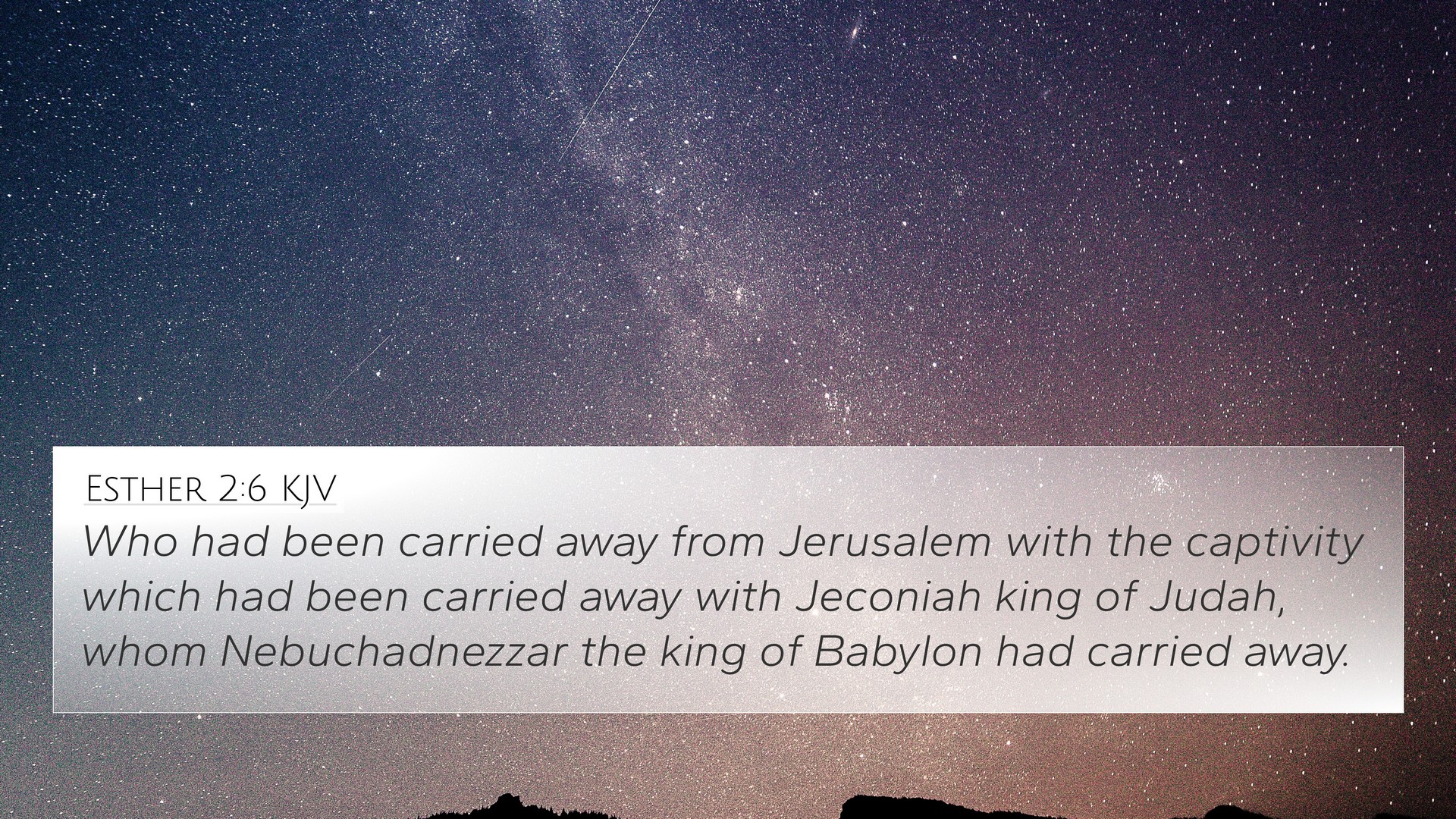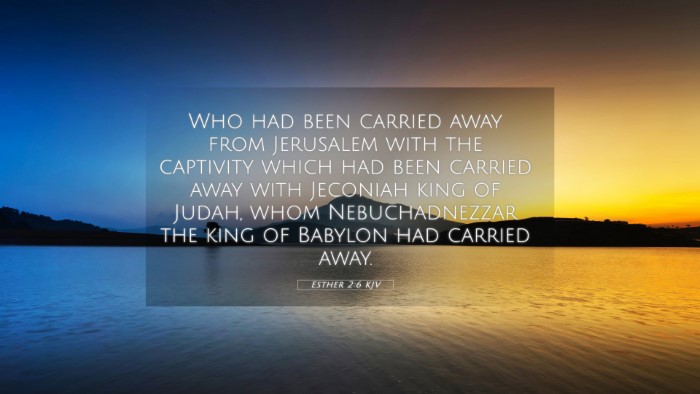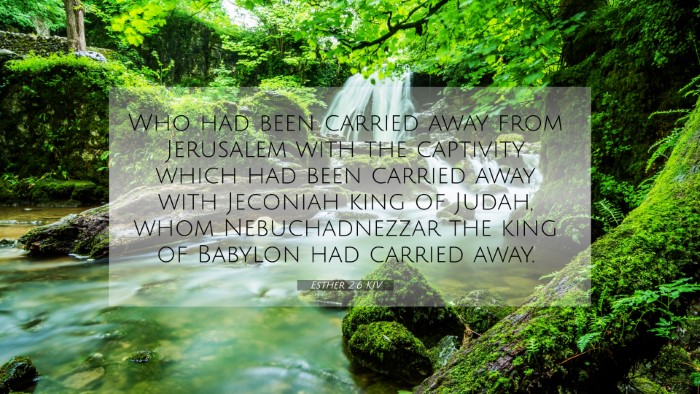Old Testament
Genesis Exodus Leviticus Numbers Deuteronomy Joshua Judges Ruth 1 Samuel 2 Samuel 1 Kings 2 Kings 1 Chronicles 2 Chronicles Ezra Nehemiah Esther Job Psalms Proverbs Ecclesiastes Song of Solomon Isaiah Jeremiah Lamentations Ezekiel Daniel Hosea Joel Amos Obadiah Jonah Micah Nahum Habakkuk Zephaniah Haggai Zechariah MalachiEsther 2:6 Similar Verses
Esther 2:6 Cross References
Who had been carried away from Jerusalem with the captivity which had been carried away with Jeconiah king of Judah, whom Nebuchadnezzar the king of Babylon had carried away.
Uncover the Rich Themes and Topics of This Bible Verse
Listed below are the Bible themes associated with Esther 2:6. We invite you to explore each theme to gain deeper insights into the Scriptures.
Esther 2:6 Cross Reference Verses
This section features a detailed cross-reference designed to enrich your understanding of the Scriptures. Below, you will find carefully selected verses that echo the themes and teachings related to Esther 2:6 KJV. Click on any image to explore detailed analyses of related Bible verses and uncover deeper theological insights.
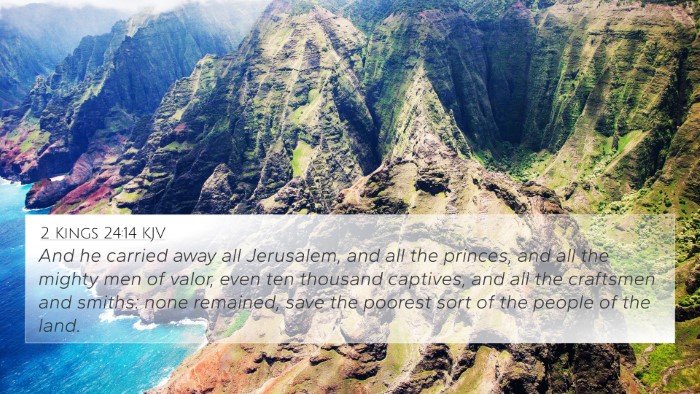
2 Kings 24:14 (KJV) »
And he carried away all Jerusalem, and all the princes, and all the mighty men of valor, even ten thousand captives, and all the craftsmen and smiths: none remained, save the poorest sort of the people of the land.
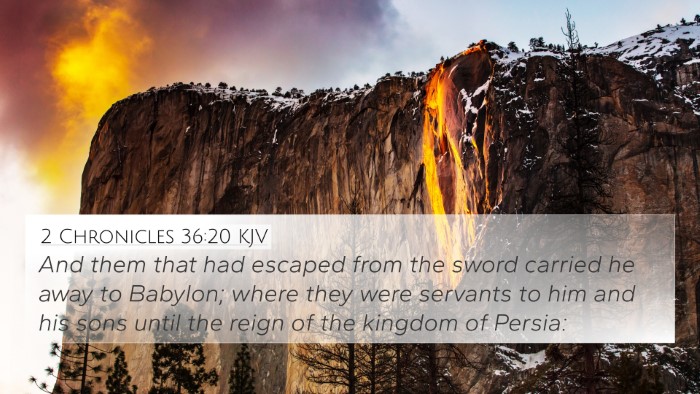
2 Chronicles 36:20 (KJV) »
And them that had escaped from the sword carried he away to Babylon; where they were servants to him and his sons until the reign of the kingdom of Persia:

2 Kings 24:6 (KJV) »
So Jehoiakim slept with his fathers: and Jehoiachin his son reigned in his stead.

Jeremiah 24:1 (KJV) »
The LORD shewed me, and, behold, two baskets of figs were set before the temple of the LORD, after that Nebuchadrezzar king of Babylon had carried away captive Jeconiah the son of Jehoiakim king of Judah, and the princes of Judah, with the carpenters and smiths, from Jerusalem, and had brought them to Babylon.
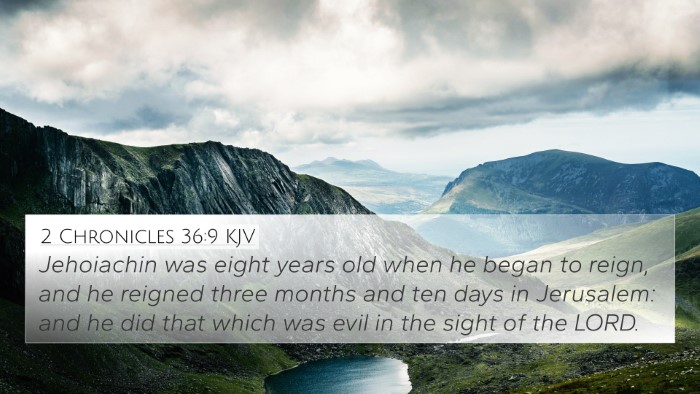
2 Chronicles 36:9 (KJV) »
Jehoiachin was eight years old when he began to reign, and he reigned three months and ten days in Jerusalem: and he did that which was evil in the sight of the LORD.
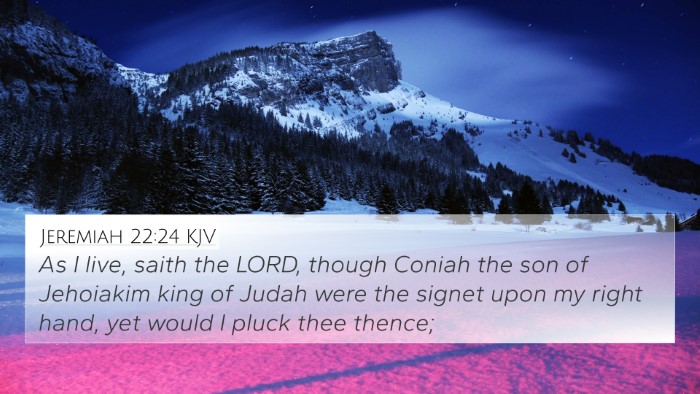
Jeremiah 22:24 (KJV) »
As I live, saith the LORD, though Coniah the son of Jehoiakim king of Judah were the signet upon my right hand, yet would I pluck thee thence;

Jeremiah 22:28 (KJV) »
Is this man Coniah a despised broken idol? is he a vessel wherein is no pleasure? wherefore are they cast out, he and his seed, and are cast into a land which they know not?
Esther 2:6 Verse Analysis and Similar Verses
Understanding Esther 2:6
Esther 2:6: "Who had been carried away from Jerusalem with the captives which had been carried away with Jeconiah king of Judah, whom Nebuchadnezzar the king of Babylon had carried away."
Summary of Esther 2:6
This verse introduces Esther within the historical context of the Babylonian exile, specifically noting her background as one of the captives taken from Jerusalem. The mention of Jeconiah's deportation serves to highlight the significance of her lineage in relation to the Jewish exiles.
Commentary Insights
Insights from Matthew Henry
Matthew Henry emphasizes Esther's origins, framing her journey as part of God's greater plan for His people. He notes that despite her captivity, she would play a pivotal role in the salvation of the Jewish people. Henry suggests that God's providence is at work even in dire circumstances, pain, and suffering, aligning with the notion that Esther's background prepared her for her future responsibility.
Insights from Albert Barnes
Albert Barnes points out the historical details in this verse, elaborating on the importance of Jeconiah's captivity and the significant number of people affected. He remarks that Esther's mention as one of these captives illustrates both her humble beginnings and the way God can elevate individuals for His purpose. Barnes also highlights the implications of exile and restoration, which foreshadow the larger theme of redemption through Esther's actions.
Insights from Adam Clarke
Adam Clarke provides a detailed examination of the historical context surrounding Esther’s situation. He discusses the importance of captives in the ancient world and how this sets the stage for Esther’s rise in the Persian empire. Clarke emphasizes the significance of her lineage and how it underlines the faithfulness of God in preserving a remnant of His people, even amidst trials and tribulations.
Bible Cross References
Esther 2:6 relates to several key Biblical texts that mirror similar themes of exile, God’s providence, and the preservation of His people. Here are some notable cross-references:
- Jeremiah 29:10-14: Discusses the future restoration of the Jewish people following exile.
- 2 Kings 24:14-16: Details the deportation of captives during the Babylonian conquest.
- Daniel 1:1-6: Accounts of the Babylonian captivity and the importance of heritage.
- Isaiah 43:1-2: God's reassurance to His people during times of trouble and captivity.
- Ezra 1:1-4: The decree allowing Jews to return to Jerusalem after exile.
- Nehemiah 1:3: The report on the condition of Jerusalem and the exiles’ situation.
- Psalms 137:1-6: A lament of the exiles and their longing for Jerusalem.
Connections and Themes
Esther 2:6 encapsulates significant themes found throughout the Bible. It emphasizes:
- The providence of God in seemingly adverse circumstances.
- The importance of heritage and descent in God’s plans.
- The transition from captivity to a position of influence and leadership.
- The role of women in Biblical narratives, showcasing strength and courage.
Inter-Biblical Dialogue
The connections between Esther's narrative and other Biblical texts create an inter-Biblical dialogue that enriches our understanding of God's work through history. The links between themes of exile, hope, and restoration provide a more profound perspective on Esther’s impact on the Jewish people and God’s overarching redemptive story.
Conclusion
Understanding Esther 2:6 through these commentaries and its cross-references allows for a deeper appreciation of how God operates in the lives of His people, particularly through those who may not seem significant at first glance. This verse sets the stage for the unfolding drama of Esther’s life—a testament to God’s fidelity and plan for deliverance.
